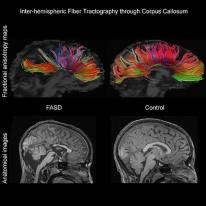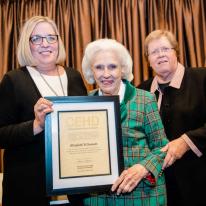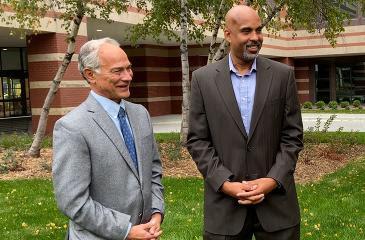The Synapse: May 2022
Six Months at the MIDB
With the MIDB recently crossing the six-month mark since its opening, we wanted to take this opportunity to reflect on the early work of the institute and express our sincere gratitude for the partnerships developed in getting this venture off the ground.
First and foremost, the first six months have furthered our belief in our mission. The fundamental goal of bringing together clinicians, researchers, educators, and policy advocates in one location to foster collaboration and advance brain health has been achieved. Despite the ongoing challenges posed by the COVID-19 pandemic, building use is increasing and collaboration is happening. Whenever we walk around the facility, we are thrilled to see people collaborating in shared spaces.
The addition of Monica Luciana as MIDB’s chief scientific officer has furthered this collaboration across units, and the newly announced Interdisciplinary Seed Grant program will foster additional partnerships. We’re also excited to begin the MIDB’s Colloquium Series this Thursday where we’ll discuss our vision for the MIDB moving forward. But it isn’t just the promise of the future, there is tangible evidence to demonstrate that we are moving in the right direction. Some early highlights include:
- New research published in Nature that shows most published brain-wide association studies are performed with too few participants to yield reliable findings.
- The University of Minnesota received two grants totaling $26 million from the National Institutes of Health for research on the impact of substance exposure during pregnancy on child brain and behavioral development. MIDB serves as a key data collection, management, and analysis site for the HEALthy Brain and Child Development (HBCD) Study, a large, multi-institution project with 25 study sites across the country.
- A team of MIDB researchers and colleagues published their Adolescent Brain Cognitive Development (ABCD) Community MRI Collection and Utilities study. The ABCD Study, a 10-year longitudinal neuroimaging study of the largest population based and demographically distributed cohort of 9-10 year olds, was designed to overcome reproducibility limitations of prior child mental health studies.
- The Institute on Community Integration received a five-year, $1.4 million award to collaborate with other organizations on the project A Community-Based Collaborative Transition Model for Minnesota Youth with Intellectual and Developmental Disabilities which is designed to increase independence of Minnesota’s youth and create pathways to post-secondary education and employment.
- Two MIDB projects were funded by the Masonic Cross-Departmental Grants in Children’s Health Research: Development of a New Approach for Individualizing Treatment of Childhood Psychiatric Disorder and Revealing a Common Impairment Underlying Diverse Neurodevelopmental Disorders.
Finally, we want to say thank you to everyone who has played a role in the development of the MIDB and our move to the new building. From the conception of a new institute devoted to child and adolescent brain health, to the intensive planning for a new facility and moving units from all over the University to the building last fall, this process has been bolstered by partnerships across University units and with our clinical partner M Health Fairview.
Damien Fair, PA-C, PhD, and Michael Georgieff, MD
MIDB Co-Directors

Published in Nature: Reference Model for Brain Growth Over Human Lifespan
An international team including researchers from the MIDB have created a new tool that benchmarks brain development over the human lifespan, based on magnetic resonance imaging data from more than 100,000 individuals. Described in Nature, the interactive open resource, known as BrainChart, harmonizes brain images in a way that will allow researchers to measure brain development against reference charts like those used for evaluating children’s height and weight. "This work has the potential to bring brain development to the pediatrician’s office in the same way growth charts have assisted in our care for decades,” said co-author Damien Fair, PA-C, PhD, Redleaf Endowed Director for the MIDB. “It is an amazing effort that will have a lasting impact on the characterization of brain changes across the lifespan." Read more about the study.

Unlearning Ableism
Why is disability often excluded from conversations about equity, social justice, or diversity? A team from the Institute on Community Integration presented this and other topics at the Disability Justice Workshop Series in two separate forums this month. The five-part series engages participants who want to create campuses and other environments that transcend the basic requirements of the Americans with Disabilities Act. “The ADA is critical, but it is not going to change people’s minds about seeing people with disabilities as less than,” said Rebecca Dosch Brown, interdisciplinary education director at ICI. Katrina Simons, a community program specialist at ICI who helped Dosch Brown create and present the series, added, “We are at a point now in the evolution of disability justice where we can move past the basics and get to a place where we are creating truly inclusive organizations.” Learn more about the series.

Understanding the Links Between Parental and Adolescent Substance Use
Sylia Wilson, PhD, assistant professor in the Institute of Child Development, and colleagues recently received a $4.6 million grant from the National Institute on Drug Abuse for their study, “Understanding the Links Between Parental and Adolescent Substance Use: Complementary Natural Experiments Using the Children of Twins Design.” They will seek to identify mechanisms of parent-child transmission of substance use, determine effects of cannabis legalization on parents, families, and adolescents, and understand the influence of behavioral disinhibition on adolescent substance use in the context of cannabis legalization in two large, population-based, twin family samples in Colorado and Minnesota. Read more about this study.

Kudos
Megan Gunnar, PhD, Distinguished McKnight University Professor, was recently elected into the National Academy of Sciences, which was established to provide independent, objective advice to the nation on matters related to science and technology.
Monica Luciana, PhD, Distinguished McKnight University Professor, was named a 2022 Dean’s Medalist, a high honor which recognizes scholars who exemplify the highest standards of research, instruction, interdisciplinary reach, University citizenship, academic leadership, and local and national engagement.
Kathryn Cullen, MD, associate professor of Psychiatry and Behavioral Sciences, and Igor Nestrasil, MD, PhD, assistant professor of Pediatrics, each received a Wallin Neuroscience Discovery Award, which encourages the U of M’s talented neuroscientists to think outside of the box and pursue promising research that has the potential to improve countless lives here in Minnesota and across the globe.

Advancing Work to Help Children with Fetal Alcohol Spectrum Disorders
Jeffrey Wozniak, PhD, LP, professor of Psychiatry and Behavioral Sciences, and his team are beginning the next phase of their work to improve the outcomes for children with fetal alcohol spectrum disorders (FASDs). Their new project is part of the work they’re doing with the international group the Collaborative Initiative on Fetal Alcohol Syndrome Disorders (CIFASD) under the auspices of the National Institute of Alcohol Abuse and Alcoholism. The collaborative is studying FASDs from multiple perspectives, including genetic, embryological, brain, cognition, and prevention. “CIFASD has brought together researchers at the basic science level who are studying genetics in zebrafish and rodents and learning how alcohol affects the development of an organism at a very basic level,” Wozniak explained. “I’m working with other researchers studying children and working with their parents. Bringing all these specialties together and having them interact and share data is a unique and powerful way to push our knowledge forward. We learn from each other at all these different levels of science.” Read more about this FASD research.

A Champion for Child and Adolescent Research
One of MIDB’s very first philanthropic champions is Elizabeth Bennett, '50 (College of Education and Human Development). Bennett, who studied child welfare, is known for her lifelong commitment to advancing children’s health care in our community. She was a founding member and chair of the Children’s Hospitals and Clinics of Minnesota board and currently serves on the M Health Fairview Masonic Children's Hospital Philanthropic Board. She is an equally avid and longtime supporter of the University of Minnesota. She has served on multiple U of M capital campaigns, including two with her late husband, Russell, and currently is an honorary member of the Driven Campaign. Bennett is also a former Chair of the Board of the University Pediatrics Foundation and the U of M Medical Foundation. Through her many involvements, Bennett continues to emphasize the importance of research as a critical element to children’s health services. She is also an enthusiastic fan of Gopher football and proud grandmother.
Funding and Award Opportunities
- MIDB Interdisciplinary Faculty Research Awards: Application due by June 1
- MIDB Graduate Student and Postdoctoral Fellow Research Awards: Application due by June 1



